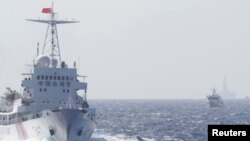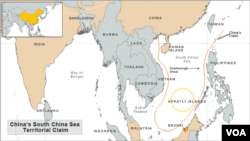China is sending a second oil rig near Vietnamese waters in an apparent escalation of its dispute with Hanoi over the exploitation of resources in the South China Sea.
China's Maritime Safety Administration says the rig, operated by the state-owned China National Offshore Oil Company, will arrive Friday south of the Chinese island of Hainan.
Though it is not clear if the oil platform will be located in waters claimed by Vietnam, the move will likely be seen by Hanoi as a provocation of a dispute that intensified last month.
The Global Times, a popular tabloid published by the Communist Party's official People's Daily, quoted Zhuang Guotu, director of the Center for Southeast Asian Studies at Xiamen University, as calling the rig deployment a “strategic move”.
“The increase in oil rigs will inevitably jab a sensitive nerve for Vietnam and the Philippines,” Zhuang said.
Beijing's May deployment of its biggest oil rig to an area close to the disputed Paracel Islands set off deadly anti-China protests in Vietnam and led to dangerous high-sea clashes.
China's moves have also rattled others that have competing territorial claims with China in the South China Sea, including the Philippines, Malaysia, Taiwan and Brunei.
Australia's foreign minister, Julie Bishop, told VOA that she hopes all countries involved in the disputes can reach a negotiated settlement and reduce tensions.
"We call on all parties to the dispute to de-escalate the tensions and to resolve such disputes amicably through peaceful negotiations. Australia does not take sides in specific disputes, but we call on parties to negotiate and to resolve the issues in accordance with international law. The countries of ASEAN are proposing a code of conduct with China and we support that policy decision," said Bishop.
China's decision to deploy a second rig comes after this week's high-level talks in Hanoi between Chinese and Vietnamese leaders failed to resolve the dispute.
In the talks, China's State Councilor and top diplomat Yang Jiechi told Vietnam to stop disturbing Chinese operations in the area and "hyping up" disputes over an island chain he called "China's inherent territory."
Vietnamese Prime Minister Nguyen Tan Dung, who met with Yang Wednesday, said China is violating international law. He called for the withdrawal of the Chinese rig, which is scheduled to remain in the area until mid-August.
Hanoi says Chinese ships accompanying the rig sank one of its vessels and damaged 24 others, as well as injured 12 members of its fisheries surveillance force. Beijing accuses Vietnamese ships of being the aggressors, saying they have rammed Chinese vessels 120 times since early May.
This story produced in collaboration with VOA's Korean Service, some information provided by Reuters.
China's Maritime Safety Administration says the rig, operated by the state-owned China National Offshore Oil Company, will arrive Friday south of the Chinese island of Hainan.
Though it is not clear if the oil platform will be located in waters claimed by Vietnam, the move will likely be seen by Hanoi as a provocation of a dispute that intensified last month.
The Global Times, a popular tabloid published by the Communist Party's official People's Daily, quoted Zhuang Guotu, director of the Center for Southeast Asian Studies at Xiamen University, as calling the rig deployment a “strategic move”.
“The increase in oil rigs will inevitably jab a sensitive nerve for Vietnam and the Philippines,” Zhuang said.
Beijing's May deployment of its biggest oil rig to an area close to the disputed Paracel Islands set off deadly anti-China protests in Vietnam and led to dangerous high-sea clashes.
China's moves have also rattled others that have competing territorial claims with China in the South China Sea, including the Philippines, Malaysia, Taiwan and Brunei.
Australia's foreign minister, Julie Bishop, told VOA that she hopes all countries involved in the disputes can reach a negotiated settlement and reduce tensions.
"We call on all parties to the dispute to de-escalate the tensions and to resolve such disputes amicably through peaceful negotiations. Australia does not take sides in specific disputes, but we call on parties to negotiate and to resolve the issues in accordance with international law. The countries of ASEAN are proposing a code of conduct with China and we support that policy decision," said Bishop.
China's decision to deploy a second rig comes after this week's high-level talks in Hanoi between Chinese and Vietnamese leaders failed to resolve the dispute.
In the talks, China's State Councilor and top diplomat Yang Jiechi told Vietnam to stop disturbing Chinese operations in the area and "hyping up" disputes over an island chain he called "China's inherent territory."
Vietnamese Prime Minister Nguyen Tan Dung, who met with Yang Wednesday, said China is violating international law. He called for the withdrawal of the Chinese rig, which is scheduled to remain in the area until mid-August.
Hanoi says Chinese ships accompanying the rig sank one of its vessels and damaged 24 others, as well as injured 12 members of its fisheries surveillance force. Beijing accuses Vietnamese ships of being the aggressors, saying they have rammed Chinese vessels 120 times since early May.
This story produced in collaboration with VOA's Korean Service, some information provided by Reuters.





